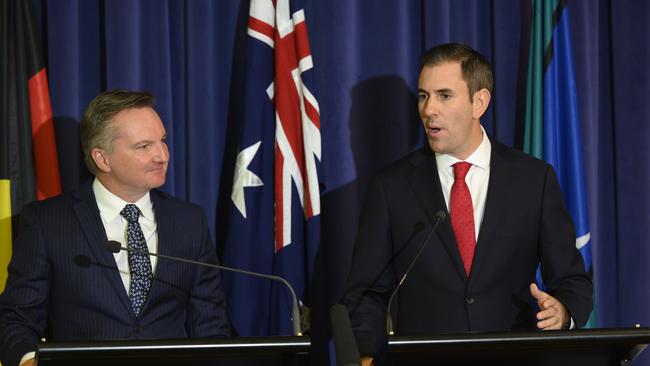
Everything – and I really mean everything – pivots on which way one of the three ultimately swings.
They are the Prime Minister Anthony Albanese, the Treasurer, de facto deputy-PM and would-be prime ministerial successor Jim Chalmers, and the Climate Change and Energy Minister – and, I suggest, what most would have forgotten (I certainly had), a one-time temporary opposition leader – Chris Bowen.
It is really quite extraordinary – and, extraordinarily, largely unremarked – how both the new government overall and individual ministers have kicked off.
Coming into office and faced with major crises across a wide front – soaring electricity, gas and petrol prices, the very real prospects of blackouts, much broader generalised inflation, interest rates rising sharply, supply shortages, labour shortages, all directly impacting Australians across the board, and the not exactly “finished” business with Covid – one would normally have expected some effort by the government to at least be seen to be “doing something about” at least some of it.
Yet there’s been no attempt to even pretend to try, no attempt to go through even the charade of crisis-directed cabinet meetings, and almost zero commentary – far less critiques – across the media about it all.
Indeed, almost literally the first thing the new PM did was to get on a plane – I suggest, far sooner than any of his predecessors; even noted jetsetter Kevin Rudd took 10 days to do so – and he’s hardly been back since, far less chairing urgent cabinet meetings.
As I noted earlier in the week, we should now, if belatedly, understand the real message from that campaign blunder when the would-be PM could not nominate the cash and jobless rates. It wasn’t a one-off brain fade, but a fundamental statement that Albanese, like his famous predecessor Gough Whitlam, has zero interest in not just the economic detail but even more importantly – and disturbingly – the economic reality.
Again, to “fly away from it all”, to put meaningless global glad-handing ahead of thinking about – far less actually doing something about – things that are hurting Australians, was not a “poor judgment call” but a fundamental statement of exactly the PM Albanese will be.
Like Whitlam, he’ll not simply sit above it all, he will be functionally disinterested – in both the correct and colloquial meanings of the word – in what his economic ministers, other economic policy influencers, and the vagaries of the economy itself are getting up to.
He won’t be a Bob Hawke, an active and controlling chairman of cabinet, but more a “cabinet cat”, an indifferent Whitlam 2.0, letting all the mice play, so to speak, even in his presence.
This bestows enormous independence and even more responsibility on Treasurer Chalmers like we have not seen since the days of Whitlam, or perhaps in the end-days of Hawke’s premiership which had some of the flavours of 1975 about them.
But first, the Climate Change and Energy Minister. As I’ve noted the order in the title is deliberate, instructive and, as we have already seen, disastrous.
Bowen’s primary concern is posturing on climate change – and he’s seized it with gusto. Actually securing energy for Australians, far less securing energy which is cheap, plentiful and reliable, far less right now, is an entirely secondary concern.
In fact, as Bowen made clear in his ‘‘landmark’’ speech on Wednesday, it’s not even that. Preferencing climate change over energy is bad enough in general terms; giving it to Bowen to administer – under the oversight of an indifferent PM – is setting us up for (Jim) Cairns-level disaster.
Furthermore, blowing out the budget, as Cairns as a non-treasurer was able to drive through Cabinet in 1974, was a disaster; what mix of childish enthusiasms and basic ineptitude that a rampant Bowen is intent on delivering, in completing the destruction of our energy system, will be far, far more seismic and structural.
This brings us back to Chalmers. In economic policy he is obviously pivotal, especially under an indifferent PM.
But given the reality of Bowen and climate change lunacy, the future of the government and the future of the entire country, more importantly, pivots on the necessity of a titanic real-world real-time policy struggle developing between Chalmers and Bowen, and Chalmers and reality winning.
I have to say the omens are not overwhelmingly encouraging.
Yes, positively, Chalmers has – largely – spent the first month closeted with Treasury Secretary Steven Kennedy and RBA governor Philip Lowe; just as Paul Keating did in 1983, sucking up all that then Treasury secretary John Stone had to give him. This is not to argue that Lowe and particularly Kennedy are the sources of all economic wisdom – as I have noted. But they do have critically valuable things to tell and to teach the new Treasurer.
And the Minister with a “degree in Paul Keating” – as one of my editors describes him – has joined Lowe in backing generalised wage rises starting with a ‘‘3’’.
He knows that if the 5.1 per cent his government has backed for the minimum wage became generalised across the economy it would set off exactly the feared wage-price spiral that would be economically devastating.
It would also destroy the government.
But he did make that silly – and quite incorrect (early) statement that inflation was “out of control”. It is not – yet; and loose talk from a treasurer always has consequences. And he’s made the same ludicrous comments on climate change that could have been voiced by Bowen.
So, we shall see.




It should already be clear that there are three critically important ministers for your wellbeing in the new government, but for very different and far from reassuring reasons.